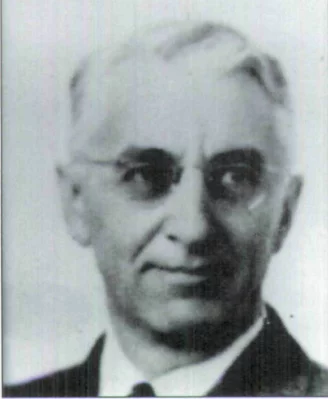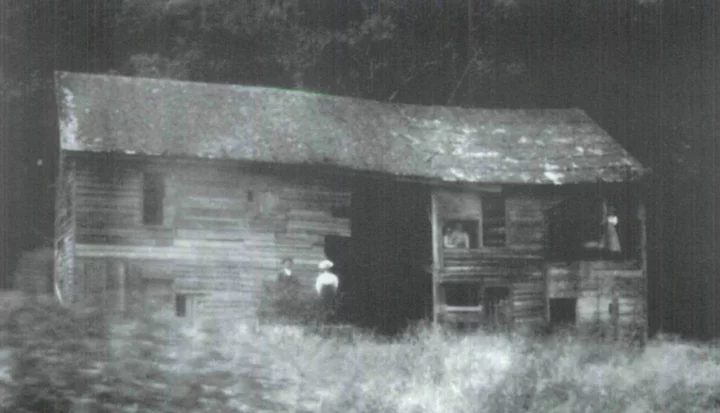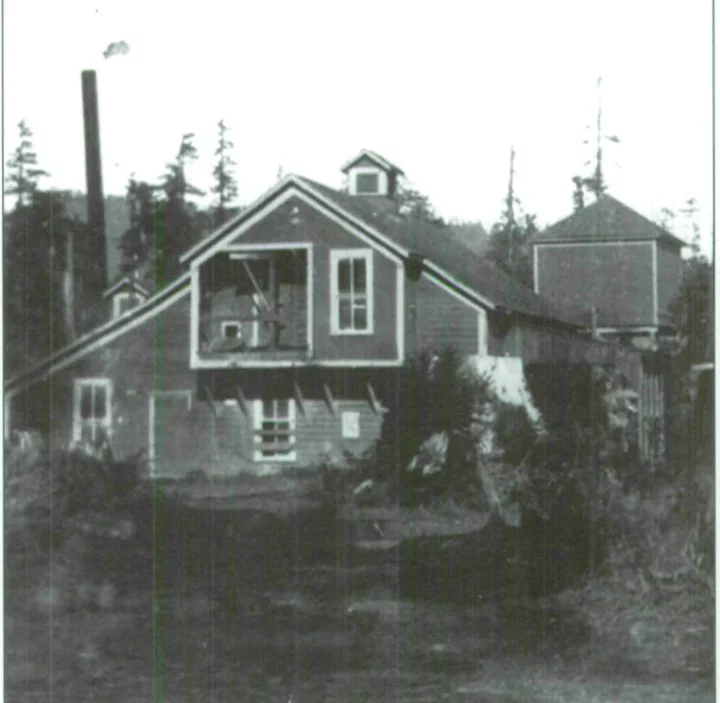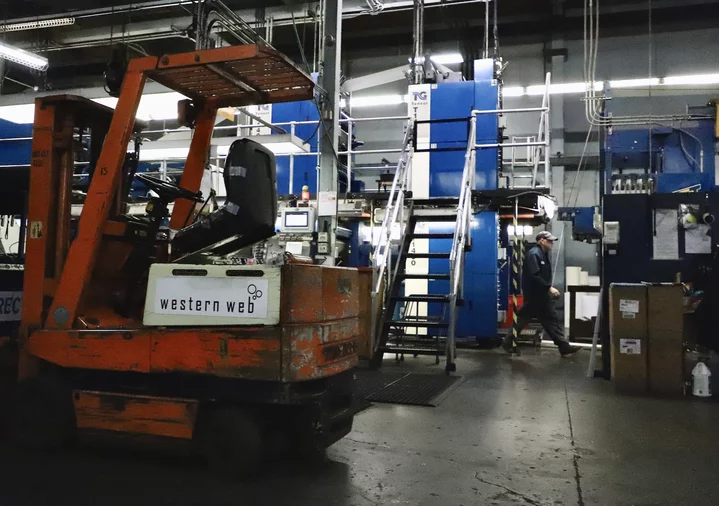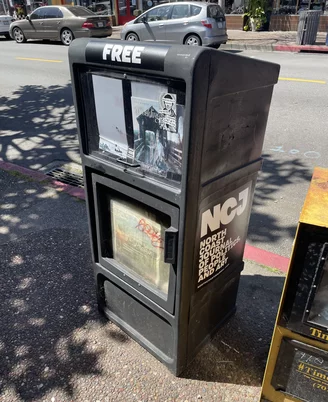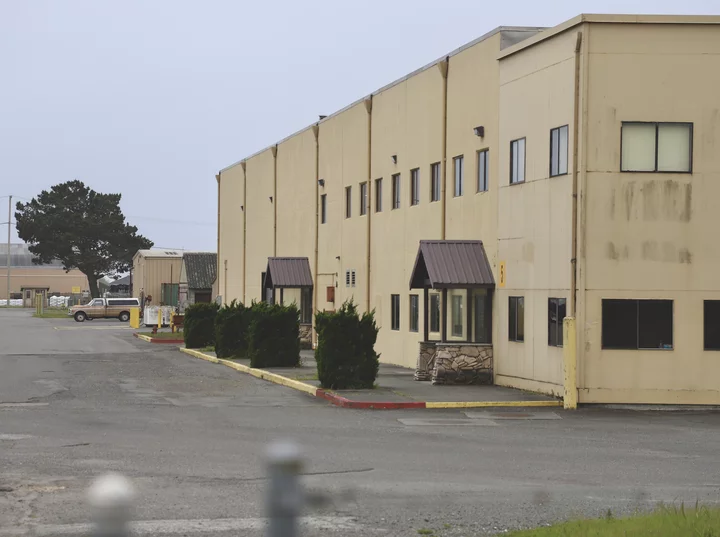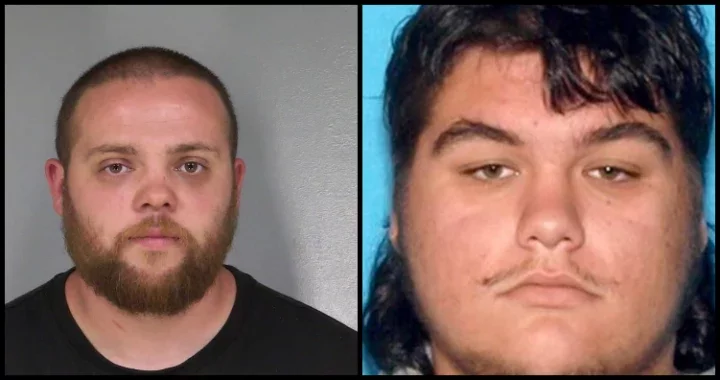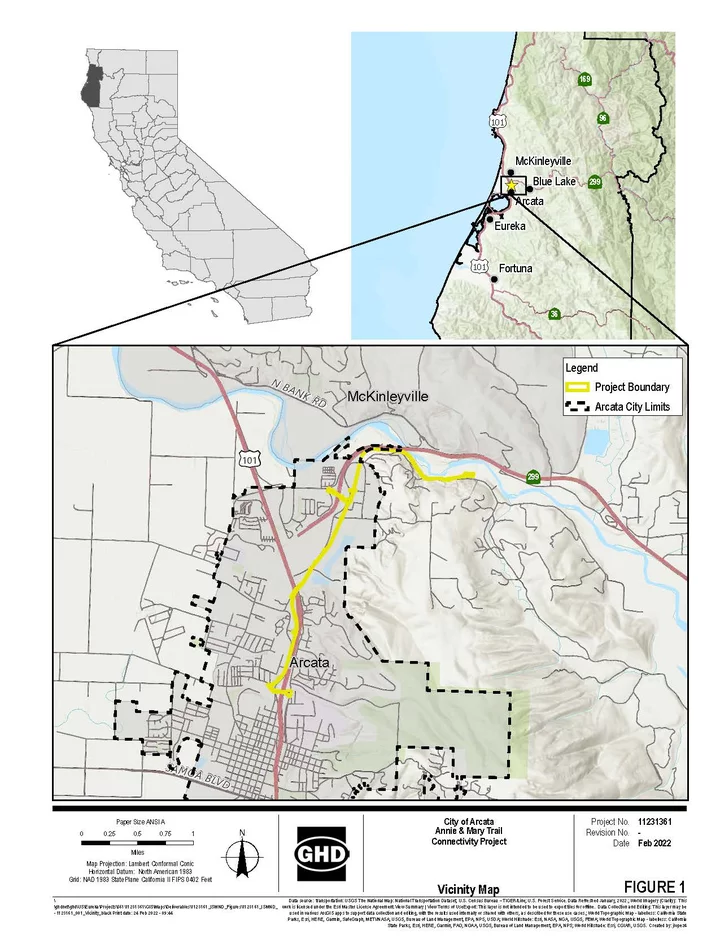Wanted Hoopa Man Arrested With Suspected Heroin and Drug Paraphernalia, Sheriff’s Office Says
LoCO Staff / Saturday, April 19, 2025 @ 11:11 a.m. / Crime
Humboldt County Sheriff’s Office press release:
On April 17, 2025, a Hoopa Valley Tribal Police Officer, who is cross deputized with the Humboldt County Sheriff’s Office (HCSO), along with an HCSO deputy were conducting routine patrol in the Hoopa Valley. At about 10:45 p.m., officers conducted a vehicle investigation on Highway 96 just south of Loop Road, Hoopa, and contacted Darin Byron Marshall Jr. (age 41). Through their investigation, officers learned that Marshall had a felony warrant for his arrest. Marshall was subsequently placed under arrest for his warrant and a search of his vehicle was conducted. Officers located several items of drug paraphernalia and approximately 7 ounces of suspected heroin.
Marshall was later transported to the Humboldt County Correctional Facility where he was booked on the following charges:
- Possession of a controlled substance for sales - HS 11351
- Bench Warrant / Failure to Appear on Felony Charge – PC 978.5
Anyone with information about this case or related criminal activity is encouraged to call the Humboldt County Sheriff’s Office at (707) 445-7251 or the Sheriff’s Office Crime Tip line at (707) 268-2539.
BOOKED
Today: 2 felonies, 10 misdemeanors, 0 infractions
JUDGED
Humboldt County Superior Court Calendar: Today
CHP REPORTS
No current incidents
ELSEWHERE
RHBB: Brr! Storm System to Bring Heavy Rain and Lower Snow Levels Across Northwest California
RHBB: Snowpack in Klamath National Forest Well Below Average After Dry Winter Start
RHBB: Major Roadwork Scheduled Friday February 13 through Thursday, February 19
RHBB: Six Rivers National Forest Hiring Seasonal Recreation Workers
HUMBOLDT HISTORY: The Life and Times of Incubator Flat
Maxwell C. Rowley / Saturday, April 19, 2025 @ 7:30 a.m. / History
Before Mary Angelina Lipscomb argued with her husband in 1906, Incubator Flat was just another bare spot half way between Hydesville and Carlotta.
But the argument, which took place at the couple’s homestead near Fort Baker in eastern Humboldt, could not be resolved. After a flurry of angry words, Abraham Lipscomb left in a huff. He returned to his roots in West Virginia and never set foot in Humboldt County again.
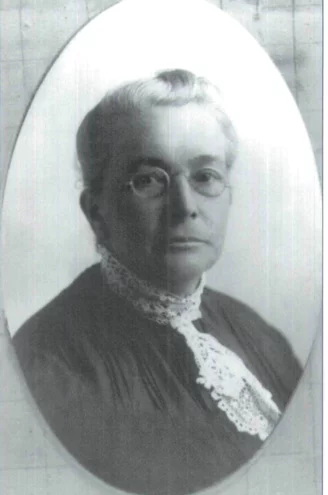
Mary Angelina Lipscomb, shown in a 1916 portrait, was the progenitor mother of Incubator Flat. Spesert Photo, courtesy Maxwell Rowley. All photos via the Humboldt Historian.
Lina, as she was known, was not one to fold under. The daughter of a wealthy West Virginia family, she was well- educated, independent, and adventuresome. She sold the Fort Baker homestead to the Robert Porter family in 1907 and the following year purchased new property some seven miles southeast of present-day Fortuna.
Lina and Abraham had come to Humboldt County from West Virginia in 1893. She and her husband traveled from San Francisco by steamer and, along with eight children, homesteaded at Fort Baker in 1894. Six of the children, Jennie, Frank, Willis. Edwin, Mary Jane, and Sarah, were Lina’s by her late first husband, William Spesert. Oscar and Ferris Lipscomb rounded out the family; during the thirteen years the family spent at Fort Baker, Cyrus, Joseph, and Lewis Lipscomb were added.
These eleven children came with her when she settled in her new home at what was to become known as Incubator Flat. Eventually these children matured, married, and started families of their own. They did not, however, leave the nest. They built additional homes on the flat, and when their own children were grown they too settled down on Grandmother’s flat. In the decades following Lina’s purchase in 1908, there evolved a large related clan, living on a stretch, now called Fisher Road, barely a quarter mile in distance.
Needless to say, this rapidly increasing family required a lot of medical attention.
Dr. Harold W. Comfort, a Fortuna physician, was the doctor of choice. He was summoned to deliver babies on the flat at frequent intervals, day and night. Dr. Comfort made many hasty trips to the area over a span of twenty years, bringing babies into the world. He reportedly remarked that so many babies were being born on the flat, it reminded him of a chicken ranch, where incubators were used to hatch volumes of chicks. So the area was dubbed Incubator Flat. The name stuck, and old-time local families from Hydesville and Carlotta areas use the term to this day.
The children born on Incubator Flat had close ties. Grandfathers, grandmothers, fathers, mothers, aunts, uncles, brothers, sisters, and cousins by the dozen all crowded into a small space on Incubator Flat. When school time approached in the morning, it was a mile walk uphill to the Hydesville Grammar School. Students would string out on Highway 36 in pecking order, like ants scurrying from the nest. Unrelated neighbors could identify the kid’s parents by the color of the kid’s hair and complexion. There were all hues of hair: brown, black, red, and blond — with straight, kinky, wavy, and bushy texture. Skin coloring ranged from white and pink to dark, very dark, and swarthy. Incubator Flat was well represented by different nationalities, English, German, Dutch, French, Scotch, Irish, Native American, Danish, Egyptian, Armenian. Portuguese, Bavarian and God knows what else.
Incubator Flat today, between Hydesville and Carlotta just south of Highway 36 along Fisher Road. You can zoom in or out on this map, or use the button in the upper right to switch to a topological map view.
Unemployment on Incubator Flat did not exist, even in the hardest of times. The families consumed large quantities of food, milk, water, clothes, shoes, and firewood. Everyone worked at something. Most able-bodied men worked in the Hammond, Holmes Eureka, and Pacific Lumber Companies logging operations. Others worked for the large dairies and hay ranches adjacent to Hydesville, Carlotta, and Cuddeback.
Large farms near Incubator Flat in those times were under the ownership of the Fisher, Langdon, Beck, Rocha, Reynolds, Robinson, Walker, Holm, Gondola, Mantova, Filby, Fielden, Gould, Vance, and Gray families. The Incubator Flat clan simply had to work where work was available. They could not be picky. A number of young, unmarried women worked in the logging camps as cooks, waitresses, maids, and laundresses.
The older children of Incubator Flat made up a large labor pool for local ranchers. In summer the young workers could be seen in the fields weeding carrots and beets, pulling unwanted mustard and radish in the vast cultivated prairies of the Hydesville plateau. Some teenagers found work in vegetable gardens, on dairies milking cows, harvesting the Shasta and Lassen varieties of strawberries, or picking Bing and Tartarian cherries. At the turn of the century Hydesville was well known for these fruit crops.
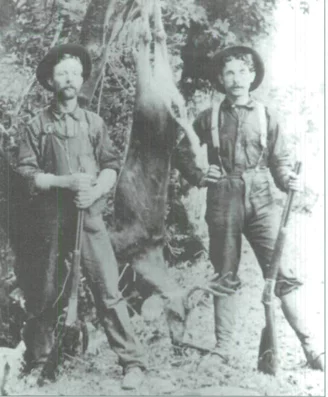
Incubator Flat men hunted deer near Yager Valley for sport and survival. Left, Frank Spesert, the early day photographer, and Henry Rowley in 1915. (Courtesy Jack and Joy Risling)
When spare time was available, the men folk hunted for deer, cottontail rabbits, quail, pigeons, and ducks. The Incubator Flat juvenile population swarmed Mill, Ward, and Yager Creeks fishing for trout, spearing and gaffing salmon and steelhead. Game wardens most often looked the other way and bypassed streams close to concentrations of people.
The Depression years of 1929 to 1940 were severe, but everyone survived with close family ties and good memories. It is estimated that by the late 1930s more than sixty people, all related, lived on a cramped Incubator Flat. But during World War II the families began to break up. Some small families moved away to higher paying defense jobs created by the war. Many men went into the armed forces to serve their country.
After World War II very few returned to Incubator Flat; most settled in other parts of Humboldt County and Northwestern California. Today only the Rowley descendants reside on Incubator Flat. Merry Jane Dinsmore lived on the Rowley place at the flat for most of her eighty-five years. She passed away in 1995. Merry Jane’s sister, Joy Rowley Risling and her husband. Jack, now live on the property.
The oldest remaining former residents of Incubator Flat are Rachel Peck, age 94, Jennie Corbett, 92, and Frances Anderson, 82, from Fortuna, Carlotta, and Table Bluff, respectively.
While most of the early Incubator Flat residents stayed put, its founder, Lina Spesert Lipscomb Dimmitt, did not. In 1911, she pioneered another homestead at Charles Mountain near Blocksburg and lived there until 1915. She sold the property to the Russ Cattle Company, then invested in property in Hollister, California, making her home there from 1917 to 1923.
Between adventures, Lina gave birth to fourteen children. Eleven of them survived to adulthood. She found time to be a homemaker, school teacher, midwife, and farmer. Lina lost her husbands William Spesert and George Dimmitt to premature deaths and separated from husband Abraham Lipscomb. The matriarch of Incubator Flat returned there at the end of her life. She died there in 1924 at age 67.
Lina was a tough, determined, progressive lady who was dedicated to her family, church, and neighbors.
First Residents
While Lina and her clan were the first white people to settle at Incubator Flat, previous history abounds at this landmark location.
The first inhabitants were the Athabascan speaking Nongatl Native Americans. This location was claimed as wintering grounds for these aboriginal people. Each year the Nongatls would migrate down from their summer hunting and gathering grounds on the vast open prairies of Showers Pass, Fort Baker, Harts Valley, and the headwaters of Yager Creek to escape the cold and deep snows. The lower elevations were more comfortable and safe from exposure. Back home again in the winter months, the Nongatls would take advantage of the salmon runs on Yager Creek and the Van Duzen River.
Another important food source for the native bands was found near Goose Lake, where the hunters could trap and snare water fowl and small animals. If luck were with the hunters, perhaps a herd of elk would be found grazing near the marshy shores. Goose Lake is located about one half mile north of the town of Hydesville on Johnson road. The lake was drained into Mill Creek many years ago to make way for agricultural lands. Large Nongatl winter camps were located on the Langdon, Spesert, and Cooper properties. Many artifacts have been gathered on these lands over the years.
Intrusion of white settlers began as early as 1851 on Nongatl ground. Original land claims were filed by the Cooper, Langdon, Ready, Simmons, and Delaseaux families. Immediately after the arrival of these pioneers, the Nongatl waged guerrilla warfare to try and expel the foreigners from their six-thousand-year-old territory. Ambush became common on and near Incubator Flat. The Cooper family suffered the loss of three brothers, David, Aldolphus, and George. Albert Delaseaux, who was married to a Cooper sister, was also killed while plowing a field in March of 1869. A complete account of the Cooper and Nongatl tragedies may be found in The Indian Wars of the Northwest by A.J. Bledsoe.
Another significant part of the historical importance of Incubator Flat was the heavily traveled Eel River- Weaverville Trail, which was used as a major commerce route to the Trinity River gold mines from 1851 to 1870. Overgrown segments of the old trail are still visible today on the Dinsmore and Filby properties. Remains of the worn tread can be observed as it ascends out of Mill Creek, which appears as Barber Creek on current maps.
The flour mill that had been built in 1854 by the Cooper brothers was abandoned in 1862 and eventually deteriorated to the state shown in this 1892 photograph. (Courtesy Merry Jane Dinsmore Collection)
Through the years several businesses flourished, on or near. Incubator Flat. Cooper Mills was established in 1854 to grind wheat into flour that was sacked and mule-trained out to the Trinity gold mines. Tubs of butter were churned by the Cooper and Delaseaux partnership and routed over the mountain ranges to the gold fields. With the help of neighbors, the five affluent Cooper brothers financed and pioneered the Eel River-Weaverville Trail. This same group also constructed a trail to Red Bluff in 1854 to bring in dairy cattle for the Cooper butter business. The Cooper mill and dairy farm was abandoned in 1862.
Continued harassment by the Nongatl, and the early deaths of four of the Cooper brothers, caused the only surviving brother, John Cooper, to move to Idaho. After the Indian Wars subsided in 1865, John returned to the mill and farm on Yager Creek. Zena Cooper Gould and her husband, Dallas, operated the historic ranch for many years. It was well known for purebred Romney sheep and champion sheep-herding dogs.
A Grave Mystery
Other early settlers to the Incubator Flat area in 1854 were the Langdon family, who owned most of the fertile land. John Porter Langdon and his wife, Caroline, were members of a wagon train that left Council Bluffs, Iowa on May 11.1854. These pioneers traveled the Oregon and California trails to reach the west coast. There were sixty-four people in this train. John and Caroline’s first son, Thurston Platte Langdon was born on May 30, 1854, while the wagon train camped on the bank of the Platte River in Nebraska, thus providing the boy’s middle name. In Hydesville and Humboldt County he was always known as Platte Langdon.
The first local record of the Langdon name was recorded when John P. Langdon registered a brand for cattle and hogs in Humboldt County on Feb. 12,1857. The 1860 census of the Eel River Township listed Porter Langdon, 42, Caroline Langdon, 35, Thurston P. Langdon, 6, Elmore L. Langdon, 4, and Charles Langdon, 1. Minor King Langdon and Joseph Avery Langdon, brothers of John Porter Langdon, arrived in Humboldt County in 1851 and 1852. These two brothers settled in the Petrolia-Mattole region.
John Porter Langdon erected a flour and lumber mill around 1862 on Incubator Flat. Water was flumed into the water wheel mill from Mill Creek. The lumber mill, located one mile east of Hydesville, produced most of the redwood boards used to build the town. Hydesville had its beginnings in 1858. Before then the area was referred to as Goose Prairie. Hydesville was a pack center for the gold trade and cattle and sheep operations for Eastern Hurnboldt, Trinity, and Mendocino counties.
John Porter Langdon met the same fate as the three Cooper brothers and Albert Delaseaux. A news article from the Humboldt Times dated September 24, 1864, announced his death:
Death of J. P. Langdon, Esq. We are again called upon to record the death of another pioneer of Humboldt County. J. P. Langdon, Esq., the deceased, left the county in May or June last, in company with others, for the Boise Mines, intending to be absent a short time only. He started with a drove of stock which he intended to take through to those mines, and had accomplished the greater part of his journey when he was set upon by Indians and in the contest with them lost his life.
The following article from the Boise News of August 27, 1864, spells out the details of the unfortunate incident.
B.F. Channel, an old California friend of ours, and one of the early prospectors in this basin, arrived here on Tuesday evening, having brought some four or five hundred head of cattle from California by Goose Lake route. He informs us that on the 21st day of July, when twenty five miles southwest of Conical Butte. between Goose Lake and Harney Valley, he in company with a gentleman from Humboldt County. California, by the name of Porter Langdon. who was also bringing through a band of cattle, together with a lad from Tower House. Shasta County, by the name of Thomas Renny, some seventeen years of age. was attacked while away from the herd of cattle that had strayed away, by fifteen Indians.
Channel, with Colt revolver, took one side of the trail, and Langdon, who had no arms with him, took the shotgun from the boy and took the other side, placing the boy between them. In this manner they rode some distance, keeping the Indians at bay. Those armed only with bows and arrows, approaching within range of pistol or gunshot, while others, having rifles, remained at a distance. At length a shot struck the boy in the back, somewhere near the spine, and he fell from his horse; a moment later Langdon was also shot, and fell mortally wounded. Acting promptly, Channel found himself out of reach, and as the ground was very hard, it was difficult for the Indians to track him, and in this manner he escaped and joined the train unhurt.
Being satisfied that both Langdon and the boy were dead, and as the party was rather weak to encounter a large band of Indians, the mountains doubtless being full of them, it was deemed unsafe to attempt the recovery of the bodies of the unfortunate, or the cattle that were lost, so they came on without them. Channel lost 150 head, and about the same number were missing from the herd belonging to the deceased Langdon. L. H. Tower and others.
The survivors sent a note by the military expressman to Colonel Drew, who was encamped with his command to the south of them, informing him of the circumstances, and requesting that proper steps be taken for redress and also the recovery and burial of the bodies of Langdon and Renny.
Mr. Langdon was a widely known and highly respected citizen of our county, and the circumstances attending his death, his absence from home in a far off wild region, render the announcement of this sad intelligence more painful. He leaves a wife. Caroline Simmons Langdon. children. Platte. T. Langdon, about 10 years. Elmore L. Langdon. 8 years, and Otilia, 2 years, to mourn his death. John Porter Langdon was 46 years old when he was killed by the Piute Indians in 1864.
Accompanying John P. Langdon on the ill-fated cattle drive to the Boise Mines were neighbors, William H. Simmons and John B. Davis of Hydesville, who both returned home unscathed.
While the Langdon family descendants knew that John P. had been buried out in the desert, they did not know the dairies location of his grave. In the spring of 1998 Eureka resident Evelyn Brogi, a descendant of John P. Langdon, set out to find her great-grandfather’s unknown burial site in Eastern Oregon. After much research and numerous disappointing visits to desert cemeteries, Evelyn contacted Eugene Luckey from the Harney County Genealogical Society in Bums, Oregon. Finally, progress was made.
Eastern Oregon lore, passed down for more than 130 years in Harney County, suggested that the isolated graves of two men existed near an old campground site called Rattlesnake Camp, Evelyn visited the area and discovered two unmarked graves fenced off by barbed wire. The fence had been erected by a local rancher to honor the dead and to protect the site. It is believed by the historians of the territory, and Evelyn Brogi, that indeed the area was the resting place of John P. Langdon from Hydesville and Thomas Renny of Tower House, Shasta County. The graves are located near Goose Lake and Harney Valley, Oregon.
The search was over and very satisfying, both spiritually and historically, for the Langdon descendants of Humboldt County.
More Industry
Around 1910 Rasmus Beck started the Woodside Creamery on Incubator flat. The creamery produced butter from the numerous dairies around Hydesville, Carlotta, Cuddeback, and American Tank. After the cream was separated from the raw milk, the skimmed milk was piped into Ward Creek, a tributary of the Van Duzen River. Only the cream was considered valuable in those times. Environmental concerns didn’t exist; no one worried about stream pollution. The Woodside Creamery shut down sometime around 1920. For a long time the creamery building was used by the Langdon Ranch to store baled hay. Kids would play in the structure, building forts, castles, and play houses out of the tons of hay stored there. Kindhearted owners didn’t care.
The Woodside Creamery produced butter from the numerous dairies around Hydesville and Carlotta. (Spesert Photo, 1910).
Downslope from the Incubator Flat highlands, less than one quarter mile, lay the lush, green. Yager Valley. There, in the valley, was the location of Cottage Grove Nursery, which was owned by the partnership of Ward and Devoy. For centuries, tremendous stands of huge, old growth redwood trees had stood as sentinels over Yager Valley. It had been logged and clear cut in the 1908-1912 period by the Newell and Mclntire shingle mill that was located in Metropolitan. Loggers felled the giant trees with hand tools, buckers used “misery whips” to cut the enormous trees into short lengths and then split out bolts for shipment by railroad to Metropolitan. There, the bolts were made into shingles.
Ward and Devoy later cleared the land of the huge leftover stumps with steam donkey engines and dynamite. Workers pulled the extracted stumps with teams of horses and mules over to Ward Creek, where the stumps were burned for several years. Yager Valley was leveled and plowed and eventually planted to rows and rows of daffodils, narcissus, and lilies. With the arrival of spring, the dale was a glorious wash of color for residents who gazed down from Incubator Flat. Much of the modern-day Yager Valley is now owned by the Mantova and Wright farms, which have dairies and also raise sheep.
Still another business succeeded on Incubator Flat from 1908 to 1917: Spesert Photos, owned by Frank Spesert and his sister, Mary Spesert Rowley. Frank and Mary were professional photographers who had apprenticed in their late teens with their uncle at his Franklin Maxwell Gallery in Fresno, California. Spesert Photos specialized in portraits, local disasters, and stereographic images. Stereoscope viewing was a popular pastime at the turn of the century. (Photographer historian Peter Palmquist wrote a detailed account of Spesert Photos in the Humboldt Historian Vol. 36 No. 6, Nov.-Dec.1985.)
The last known business on Incubator Flat was the Rowley Produce Stand, which operated from 1934 to 1945. Located at the junction of Fisher Road and Highway 36, this venture offered summer produce from July through September. Lots of Golden Bantam corn was sold each summer to passing motorists.
Fine Neighbor
Incubator flat citizens were extremely proud of a certain neighbor, Robert F. Fisher. He was elected to the California State Assembly and served from 1927 to 1933. Bob and his wife, Bess, managed the Fisher sheep and hay ranch for over fifty years. The Fisher Ranch was owned by Bob’s brother, Fred, a prominent federal judge in San Francisco. Fisher Road and the current bridge that spans Yager Creek at Carlotta on State Highway 36 are dedicated to Bob Fisher’s memory for his political service to California. Embedded in concrete on the railing of the west lane of the Yager Creek bridge is a brass plaque:
Robert Fisher
1879-1969
Soldier, farmer, state legislature 1927-1933
Dedicated to his country, community, and most of all to his
neighbors
Mr. Fisher was well known and respected by the citizens of his assembly district. Bob and Bess were role models for kindness, integrity and honesty. Ranch hands were devoted to them, and everyone on Incubator Flat wanted to be in their hire.
Another historic location near Incubator Flat, directly across from the Cooper-Gould sheep pasture in a northeasterly direction and adjacent to Yager Creek, was the site of the Holmes Eureka logging camp. In recent years Pacific Lumber Company has cold decked redwood logs over the once bustling logging encampment. The temporary village contained more than fifty structures, including four- person bunk houses, cook houses, a laundry, an office building, company store, equipment sheds, and numerous privies.
Around 1912 Holmes Eureka Lumber of Eureka logged the east and west slopes of lower Yager Creek and the headwaters of Cooper Mill Creek.
A suspension bridge was constructed across Yager Creek to gain easy foot access to Vance’s Carlotta Hotel from Yager Camp. This establishment was a favorite spot for the hard working loggers. Excellent meals, entertainment, and heavy drinking, plus hot-tempered fist fights, were common on weekends at the popular crowded Carlotta Hotel.
History continues to repeat itself at the old ghost logging camp. Just a short distance from the camp site. Pacific Lumber Company maintains a locked gate to prevent public access to their property. A group of people who support preservation of Headwaters Forest have held organized protests at the gate on numerous occasions. The protesters’ actions in North Yager Valley have received nationwide publicity. Little do the environmental protester participants know of the history that surrounds them, as they make more history themselves.
This story will not be complete until all descendants of the families who lived on Incubator Flat from 1851 to 1940 have been recorded. Just maybe you are one of those descendants.
INCUBATOR FLAT FAMILIES 1850-1940
Nongatl Band of Native Americans, Cooper, Delaseaux, Langdon, Quick, Simmons, Raymer, Barber, Vance, Fisher, Lutman, Rowley, Beck, Spesert, Lipscomb, Fraser. Peterson, Peck, Tompkins, Rocha, Bannister, Wicks, Gould, Mantova, Friend, Stephenson, Rudolph, Dumphe, Ward, Devoy, Gondola, Bruner, Eaton, Zanotti, Church, Creighton, Hamilton, Slingsby, Thayer, Baham, Smith, Stewart, Dinsmore, Gillette, Christie, Likyou.
###
The story above is excerpted from the Summer 1999 issue of the Humboldt Historian, a journal of the Humboldt County Historical Society. It is reprinted here with permission. The Humboldt County Historical Society is a nonprofit organization devoted to archiving, preserving and sharing Humboldt County’s rich history. You can become a member and receive a year’s worth of new issues of The Humboldt Historian at this link.
Amid Looming Tariffs, Folding Newspapers and Unpaid Invoices, a Humboldt County Printing Press Struggles for Survival
Ryan Burns / Friday, April 18, 2025 @ 4:40 p.m. / Business
The Western Web printing press on the Samoa Peninsula was built in 2005 to print the Eureka Reporter. | Photos by Andrew Goff.
###
When Western Web came to Humboldt County in 2005, it did so quietly — furtively, even. The state-of-the-art printing plant, assembled with brand new equipment inside a cavernous old mill building on the Samoa Peninsula, was established for the sole purpose of publishing the Eureka Reporter, an upstart daily newspaper founded by Robin P. Arkley II in order to challenge the Times-Standard.
Arkley, Eureka’s brash and well-connected commercial real estate magnate, set off a fiercely fought, if short-lived, old-fashioned newspaper war with Humboldt County’s 150-year-old daily. As a 2006 SFGate story recounted, the Times-Standard had “seemingly incurred Arkley’s considerable wrath when it failed to endorse his wife Cherie’s failed bid for Eureka mayor in 2002, a race Cherie Arkley lost by fewer than 50 votes.” (Arkley denied that this slight was his motivation for starting the paper.)
I got hired at the Times-Standard in the midst of this newspaper war, and the competition between the dueling dailies was invigorating. The news coverage at both publications benefited from the rivalry, and the two editorial staffs were robust, especially by today’s industry standards.
But there was no competition when it came to the quality of the actual papers — meaning the physical newsprint and ink. The reporters and photographers at the Times-Standard would pick up a copy of the Eureka Reporter (it was free) and jealously thumb through its pages, which were thicker and whiter — resulting in richer, sharper images — than those running our own work. Back then, the T-S was printed in-house, on equipment that was much older than the fancy new machines across the bay at Western Web.
About that name: Why would a printing plant go by the online-sounding, geographically vague moniker of Western Web? They chose the name “in order to sneak up on potential customers out of our area without the burden of explaining why it made sense to print in Eureka,” the company explains on its website.
Arkley encouraged Western Web President Steve Jackson to go out and recruit commercial clients to subsidize the cost of printing the Eureka Reporter, and he did so. The company’s first customer, signed in 2005, was the North Coast Journal. It was soon followed by other newspapers, including the Arcata Eye, the McKinleyville Press, the Ferndale Enterprise, the Humboldt Independent and Cal Poly Humboldt’s student newspapers, the Lumberjack and El Leñador.
Western Web also prints tour guides, banners and glossy magazines such as J. the Jewish News of Northern California (distributed biweekly in the Bay Area), Latitude 38 (a sailing publication), and, until this month, a variety of special publications from the North Coast Journal, such as the Humboldt Insider, My Humboldt Life and its annual Wedding Guide.
In a recent interview, Jackson recalled the company’s optimistic early days. Prior to coming to Humboldt County he’d been working at Grant Printing in San Francisco. Arkley’s company, Security National, brought Jackson up to consult on selecting a building and buying equipment for the new press, and eventually Arkley asked if he’d be interested in running the place. He’d grown up in the tiny Trinity County community of Douglas City, so coming to Humboldt appealed to him on a personal level. And the professional opportunity was too good to pass up.
“This was a chance to build my own plant from the ground up, and I took it,” Jackson said.
But 20 years later, does it still make sense to print in Eureka? Printing presses have been closing at a rapid clip across the country in recent years. Since 2005, more than 3,300 newspapers have ceased publication. Locally that includes the Eureka Reporter, which shut down during the 2008 financial crisis; the McKinleyville Press and Arcata Eye, which merged to become a single publication, the Mad River Union, in 2013; and, most recently, the SoHum-based Independent, which published its final issue last summer.
Worse yet for Western Web, three weeks ago its oldest and largest customer, the North Coast Journal, left, choosing to have its papers and various other publications printed out of the area. In an April 3 letter to readers headlined “The Price of Print,” Journal owner and publisher Melissa Sanderson cited skyrocketing print costs and said, “When we received notice that possible tariffs on Canadian paper would further increase our printing bill, we explored every possible solution, negotiating with Western Web, evaluating alternative options and considering cost-cutting measures.”
Jackson said there was more to it than that — namely, a months-long dispute about the Journal’s unpaid invoices. By the end of last month, the Journal’s balance sheet — which includes tallies for sub-customers such as the Ferndale Enterprise, the Fortuna Chamber of Commerce and Murphy’s markets — was $120,377.91. (Sanderson disputes that figure and notes that much of it was not yet due, per the terms of their agreement. More on that below.)
On top of that, Jackson said, the Humboldt Independent owed Western Web about $50,000 when it shut down, a debt he doesn’t intend to try to collect.
“I worked with them for a long time,” he said. “They fell behind every week for months on end. … I said I can’t keep doing it, and they decided to stop publishing. I know that newspapers are on the way out — printed newspapers — but it really hurt.”
Western Web also prints the Trinity Journal, and Jackson said that publication has also fallen behind on its bills.
“I grew up in Trinity County … . That’s where I learned about newspapers,” he said. “I was reading the Trinity Journal when I was a kid; it got delivered to our house. I really enjoyed printing them the last 20 years.”
But he said Western Web’s finances have reached the point where the business simply can’t carry this level of unpaid debt for months on end. On a recent trip to San Francisco, Jackson stopped by the offices of J. (the Jewish news magazine) and told them that his company is in a very difficult spot.
“I encouraged them to explore other options [for printing],” he said.
A few moments later, Jackson quietly remarked, “Our closure is inevitable.” However, he quickly backpedaled, saying, “I haven’t given up.”
But he’s worried about having to cut some production staff due to the reduced work volume. He’s worried about the Trump administration’s 25 percent additional tariffs on Canadian goods, since much of the newsprint Western Web buys comes Canadian-grown trees. (“Canada’s where all the trees are,” he said.) He worries about the future of his employees, many of whom have been working with him for decades but are not set up for retirement. And he worries about all the local publications that still rely on Western Web. What will they do if it closes?
“I’m just tired,” he said. “I don’t have the energy to fight back. But I still haven’t given up.”
The North Coast Journal situation
The Journal’s fallout with Western Web had been building for more than a year, but it came to a head at a meeting on March 17. Jackson had notified all of Western Web’s large customers that he’d soon have to increase prices due to tariffs, though he had not yet done so. (Nor has he to date, he told the Outpost.)
At the March 17 meeting, which took place at Western Web, Sanderson told Jackson and Western Web Production Manager Mike Morris that she’d gotten a quote from another printer for roughly half the cost of what Western Web was charging, according to Jackson. He was somewhat incredulous, given that most commercial printers offer pretty comparable rates, but he told Sanderson something along the lines of, “If you truly have a price that is half, you should take it.”
She did. Eleven days later, she emailed Jackson to thank him and the team at Western Web for their dedication, craftsmanship and many years of service to the Journal but said they’d no longer be using the local company for their weekly newspaper jobs.
For the sake of disclosure I should note that I worked at the North Coast Journal from 2008-2013, under previous publisher Judy Hodgson, who co-owned the paper with Carolyn Fernandez. During my time at the T-S and the NCJ I worked with several of the Journal’s current staff members, including News Editor Thadeus Greenson, Arts & Features Editor Jennifer Fumiko Cahill and Digital Editor Kimberly Wear, whom I consider colleagues or even friends, though we don’t hang out socially.
Sanderson declined to be interviewed in person or over the phone for this story, but she agreed to answer questions via email. The only question she didn’t answer was where the Journal is now being published. Asked why she didn’t want to disclose that information she replied, “It isn’t necessary.”
Both Jackson and Sanderson expressed bitterness about the breakup. Jackson forwarded the Outpost some emails from the past two years and said he simply couldn’t carry $120,000 in debt on the Journal’s behalf for months on end.
Sanderson, meanwhile, said the Journal was operating with Western Web under the same terms it had operated under for years, adhering to an arrangement that predated her purchase of the Journal on April 1, 2021. The higher debt balance was a byproduct of a dramatic increase in printing volume from the Journal, she said. Under her ownership, the company had expanded its special publications, such as My Humboldt Life, purchased the Ferndale Enterprise and picked up contract work with outside organizations such as the Fortuna Chamber.
“[W]e do upwards of half a million dollars’ worth of business with Western Web annually, depending on the year, always carrying a balance since before my time,” Sanderson said. And the Journal always pays what it owes, she said.
At 70 years old, Jackson has suffered a variety of health issues in recent years, including a burst appendix that required him to be placed in an induced coma, as well as Parkinson’s, which he’s had for more than a dozen years. He’s the person in charge of keeping track of Western Web’s accounts receivable, but due to his health he’s had periods of absence.
In July of 2023, following one of these periods, Jackson sent Sanderson an email with the subject line “Alms for the poor.”
“You have been great about paying on time and I appreciate it,” Jackson wrote to Sanderson, “but costs keep going up and I am facing a cash flow crisis at the end of this month due to overlapping paper and ink orders. I could really use your help in catching up your account as much as possible. I show you have $69,172.78 balance on your account.”
The Journal’s longstanding arrangement with Western Web was for “net 60” payment terms, meaning its bills were due 60 days after the invoice date. Technically, Jackson said, the terms of the deal were actually “net 30” (bills due after 30 days) but longstanding practice had been to allow up to 60 days for repayment.
In response to that July 2023 email, Sanderson said she’d make sure a payment was headed to Western Web the following Monday, though she added, “I can’t keep printing with the bills so high. It’s increased by over 40% since I bought the paper and I have to relook at stuff. This print expense is almost as much as my payroll now.”
According to Jackson, Western Web has only implemented one rate increase for the Journal — a seven percent hike in 2022. The 40 percent increase cited by Sanderson was mostly a reflection of increased printing volume, he said.
The billing dispute resumed early this year and quickly got testy. In a Feb. 11 email, Jackson told Sanderson that the Journal’s balance now exceeded $113,000, some of which was more than 60 days old.
“After promising to catch up when we last spoke, you have fallen further behind,” Jackson wrote.
He also said Western Web needed to implement a change. The Journal is printed on 24-inch newsprint. However, all of the other print jobs Western Web runs during that time slot use 22-inch paper.
“Our cash flow situation is so severe we cannot afford to carry inventories for both sizes,” Jackson wrote in his email. For the Journal to keep publishing at Western Web, it would need to make all future issues smaller. The tone of his email was civil but terse. “I know it is terrible out there, but I have no other options,” he said.
In her reply, Sanderson again noted how much more volume she’s doing with Western Web, adding that the paper’s printing bills now accounted for more than a third of the Journal’s budget.
“You will have to work with me over the next few months otherwise, I may have to take drastic measures and remove some print products from the community,” Sanderson wrote. In a follow-up email she said, “We are paying you as fast as we can.”
Interviewed via phone last week, Jackson said he’s frustrated by how the Journal left. Sanderson’s email delivering the news was sent after 4 p.m. on a Friday, when his staff had already placed materials on the press to print the paper the following Tuesday. And he has lots of leftover paper and ink that he purchased to publish future issues.
“I’m still paying off bills from the North Coast Journal and yet I have no income at all [from them] since March 21,” the last time Western Web received a check, he said. “They’ve just ignored us since.”
Sanderson, meanwhile, said Jackson didn’t budge when she told him about the printing deal she could get elsewhere. (Jackson said he asked to see a copy of that quote but Sanderson never provided one.)
“Steve made no effort to negotiate a more competitive price and said, ‘If you can get that price, go with my blessing.’ I took him at his word … ,” she said. “If WW had been able to partner with a paper producer that could come close to the estimates we got elsewhere, we’d still be printing in Samoa.”
She also reiterated that the Journal will pay what it owes to Western Web in the coming weeks, per the longstanding agreement.
Western Web buys its newsprint from Inland Empire Paper Company in Spokane, Wash. That company maintains and harvests its own forests here in the U.S., but still, about half of Western Web’s newsprint stock — and all of its glossy paper — comes from trees grown in Canada.
Jackson said Western Web has an energy-efficient arrangement with Inland Empire, hauling its paper supply down here to the press in Samoa and then sending back the press’s waste — trimmed borders, scraps, etc. — to be converted into recycled paper.
The future of newspapers
Over the course of two phone conversations, Jackson’s general demeanor was of pained resignation. He recalled seeing last year’s April Fools’ edition of LoCO Pollz, which joked that the Lost Coast Outpost would soon launch a daily printed edition.
“It should have made me cry,” he said. “It was a joke but it’s also the reality. It’s crazy to open a newspaper now.”
He allowed that some alternative newsweeklies are still thriving, though he noted that once-vibrant ones, like the Sacramento News & Review and its sister publications in Chico and Reno, are gone.
Sanderson maintains her faith in print. “[O]therwise I wouldn’t have bought two newspapers and the Insider and started the My Humboldt Life publication,” she said. “But thriving requires adaptation in terms of things like printing costs and focusing on the needs of readers and advertisers that aren’t being met elsewhere.”
She also said that the Journal recently reduced its circulation by almost 14 percent, decreasing from 18,000 issues per week to 15,500. The Journal is also moving its offices from an upstairs spot in the heart of Old Town to a building near the corner of Fifth and J streets, across from the Humboldt County Courthouse.
Jackson reiterated that he hasn’t given up on Western Web, though he has tried and failed to find a buyer for the business.
“If I close the doors, I’m not sure I can sell the equipment for anything other than scrap metal,” he said. The Times-Standard dismantled its printing press five years ago, sending most of its components to the junkyard.
“I’m doing the best I can,” Jackson said. “I just have to do it until it’s over.”
The Western Web building in Samoa. | Photo by Andrew Goff.
Cal Poly Humboldt’s Justin Maxon Wins Guggenheim Fellowship for Photography Project Exploring Opioid Addiction on the Hoopa Valley Reservation
LoCO Staff / Friday, April 18, 2025 @ 12:45 p.m. / Cal Poly Humboldt
Cal Poly Humboldt Photography lecturer Justin Maxon. | Photo: Cal Poly Humboldt
###
PREVIOUSLY:
###
Press release from Cal Poly Humboldt:
A Cal Poly Humboldt lecturer Justin Maxon is among the 100th class of Guggenheim Fellows, including 198 distinguished individuals working across 53 disciplines. Chosen through a rigorous application and peer review process from a pool of nearly 3,500 applicants, the Class of 2025 Guggenheim Fellows was tapped based on both prior career achievement and exceptional promise. As established in 1925 by founder Senator Simon Guggenheim, each Fellow receives a monetary stipend to pursue independent work at the highest level under “the freest possible conditions.”
To see the full list of the 2025 Fellows, go to gf.org.
“Being named a Guggenhiem Fellow is an honor beyond what words can express. I’ve gone from disbelief to a level of emotion I didn’t know was possible. It’s incredibly humbling to be named a Fellow alongside such inspiring individuals, especially those whose work I’ve admired for years,” says Maxon.
Maxon is an award-winning photographer, educator, and social practice artist who grew up between Hoopa Valley and Eureka in Humboldt County. He considers his practice interdisciplinary and collaborative, combining photography with video, performance, narrative, and sculptural forms to create dialogical spaces that foster inclusivity, community participation, and the value of person and place. Maxon often develops projects and community networks that provide individuals—often marginalized from dominant spaces—opportunities to become resources for themselves and their communities, he says.
His fellowship project, Decolonizing Care, is an applied research project that builds on his work for a New York Times Opinion piece, a collaboration with Judith Surber that examined the systemic failure in care for fentanyl addiction through the story of one family—the Surbers—on the Hoopa Valley Reservation. The project will develop training materials for medical professionals on the West Coast to establish best practices for fentanyl addiction treatment. The project seeks to build consensus among a wide range of stakeholders impacted by the fentanyl epidemic, including medical personnel, law enforcement, judges, rehabilitation workers, and drug users.
Through interactive presentations and facilitated sessions, participants will create community-driven policy recommendations, formalized through signed agreements and shared publicly via press releases, helping to amplify a unified, community-informed response to the crisis. A traveling exhibition—hosted at hospitals and health centers—will invite healthcare providers and patients into reflective, dialogical spaces designed to educate and spark conversation.
Maxon has won two first-place prizes from World Press Photo, as well as the 1492/1619 American Aftermaths grant, the Aaron Siskind Foundation Fellowship, and the Alexia Foundation Professional Grant. His work has been exhibited at institutions such as the Museum of Chinese in America, the Museo de Arte Acarigua-Araure in Venezuela, the Bermuda National Gallery, the Morris Graves Museum of Art, the Wave Pool Gallery during the FotoFocus Biennale, and the Singapore International Photography Festival.
The 100th class of Fellows is part of the Guggenheim Foundation’s year long celebration marking a century of transformative impact on American intellectual and cultural life. In addition to appointing its newest class, the Foundation also launches a refreshed brand identity and website this month and will present a special exhibit later this year in collaboration with The New York Historical, highlighting rarely-seen treasures from its vast archive.
In all, 53 scholarly disciplines and artistic fields, 83 academic institutions, 32 US states and the District of Columbia, and two Canadian provinces are represented in the 2025 class, who range in age from 32 to 79. More than a third of the 100th class of Fellows do not hold a full-time affiliation with a college or university. Many Fellows’ projects directly respond to timely themes and issues such as climate change, Indigenous studies, identity, democracy and politics, incarceration, and the evolving purpose of community. Since its founding in 1925, the Guggenheim Foundation has awarded over $400 million in fellowships to more than 19,000 Fellows.
CHP Will Ramp Up Patrols in the Coming Months to Improve Motorcycle Safety on Humboldt Highways
LoCO Staff / Friday, April 18, 2025 @ 11:50 a.m. / Traffic
Press release from the California Highway Patrol:
Arcata, Calif. – In an effort to reduce the number of motorcycle crashes, California Highway Patrol will deploy additional officers May 24, 2025 in the Humboldt Area. Officers will look for violations by both motorcycle riders and drivers that make roads dangerous for other traffic, including unsafe speed, following too closely, unsafe lane changes, and improper turning.
Motorcycle-involved crashes in California continue to be a major concern for the California Highway Patrol (CHP). From January 2023 through December 2023, provisional statistical data revealed there were 24 injury crashes involving motorcycles and 2 fatal crashes involving motorcycles in the CHP Humboldt Area jurisdiction.
Funding for these operations are provided by a grant from the Office of Traffic Safety, through the National Highway Traffic Safety Administration. Titled “Get Educated and Ride Safe (GEARS) VIII”, the grant funding assists the CHP in reducing deadly and serious-injury crashes involving motorcycles. The Humboldt Area will continue to deploy additional enforcement efforts through September 30, 2025.
Two Brothers Sentenced to Life in Prison for Rampage Through Eureka Two Years Ago
LoCO Staff / Thursday, April 17, 2025 @ 4:37 p.m. / Courts
Brandon (left) and Jesse Widmark.
###
PREVIOUSLY:
- (LIVE) Sheriff’s Office Press Conference About Yesterday’s Police Shooting on Harris Avenue
- Sheriff’s Office Issues Statement on Harris Street Incident, With Clear Photos of the Suspects and Weapons Recovered
- Eureka Police Officially Arrest One Suspect in April Assault, Police Chase That Resulted in Harris Street Shootout
- Finally Released From Hospital, Second Suspect in April Police Shootout in Eureka Arrested, Charged With Attempted Murder of Officer
###
Press release from the District Attorney’s Office:
Today, the Honorable Judge Steven Steward sentenced brothers Brandon Michael Widmark, age 29, and Jesse ChakChak Widmark, age 20, to serve life in prison for their April 2023 crimes in Eureka. On March 18, 2025, following a 7-week trial, a Humboldt County jury returned verdicts of guilt as to each of the defendants for the attempted murder of a peace officer, multiple counts of assault with a firearm on a peace officer, forcefully resisting a peace officer, and robbery. Additionally, Brandon was convicted of felony hit and run causing injury, evading an officer and causing injury, child abuse, false imprisonment, and being a felon in possession of a firearm. Judge Steward sentenced Brandon to serve 39 years 8 months to life in prison, and Jesse to serve 56 years 4 months to life in prison.
On April 18, 2023, the brothers robbed a man in a back parking lot of the Bayshore Mall in Eureka and fled the scene in a lifted red Ford truck with Arizona license plates. Brandon, who drove the truck with his brother in the rear passenger seat, girlfriend in the front passenger seat, and her toddler in the rear center seat, struck a pedestrian at the intersection of Washington and Summer Streets. He fled, leaving the seriously injured pedestrian in the street. Reports of these crimes were made, providing police officers with initial details regarding the crimes and suspects in the red truck.
Shortly thereafter, Humboldt County Sheriff’s Deputy Raleigh Willoughby observed the red truck and attempted a traffic stop. The truck fled from Dep. Willoughby through the Cutten area, northbound on Dolbeer Street toward Providence St. Joseph’s Hospital, and past the Washington Elementary School at a high rate of speed. Deputy Willoughby did not pursue at a high speed out due to public safety concerns, including it was nearly time for school dismissal. Nonetheless, Brandon continued to drive recklessly, all the while refusing pleas from his girlfriend to pull over and let her and her child out of the vehicle. At the intersection of Dolbeer and Harris Streets, Brandon collided into a vehicle causing serious injury to the people inside the vehicle.
The defendants got out the of the now-disabled truck, and armed themselves with rifles, aiming at the pursuing Dep. Willoughby in his marked patrol vehicle. Jesse fired one shot at Dep. Willoughby, missing his head by less than two feet, but striking his patrol vehicle. As this happened, both were fired upon by arriving HCSO Lt. Conan Moore, Dep. Chad Crotty, and Dep. Luke Mathieson; each defendant was shot seven times.
Although Brandon was shot before he was able to fire a round, he continued to manipulate his firearm in a manner consistent with trying to clear a malfunction or to load a round into the chamber. Brandon refused commands to drop his weapon and was subsequently fired upon by Lt. Moore that ultimately resulted in Brandon dropping his rifle.
Immediately after eliminating the threat, Dep. Willoughby, Lt. Moore, Dep. Crotty, and Dep. Mathieson began administering life-saving efforts to the brothers. The defendants were transported to St. Joseph’s Hospital where they remained until they were medically able to be housed at the Humboldt County Correctional Facility.
District Attorney Stacey Eads stated “I am extremely grateful for the heroic actions of the officers involved. The thoughtful verdicts of the jury and Judge Steward’s sentencing imposed are just, and with this outcome may these two defendants never harm another again.”
Due to the nature of the officer involved shooting, the Critical Incident Response Team, led by Eureka Police Detective Ray Nunez and Humboldt County District Attorney Investigator Ryan Hill, was deployed to take command of the scene and the investigation. Their efforts, along with the efforts of the four Humboldt County Sheriff’s Office personnel, led to the successful prosecution of this case, the jury’s verdicts, and ultimately the appropriate sentence for both defendants.
The case was prosecuted by Senior Deputy District attorney Roger Rees, with assistance from District Attorney Investigators Ryan Hill and Greg Hill, Victim Advocate Ben Duhem, as well as countless others. Brandon was represented by attorney Rebecca Linkous, and Jesse was represented by attorney Anakalia Sullivan.
Inclusionary Zoning Passes and Annie and Mary Trail is Officially a Go from Yesterday’s City Council Meeting
Dezmond Remington / Thursday, April 17, 2025 @ 4:10 p.m. / Arcata
A map of the Annie-Mary Trail.
PREVIOUSLY
Arcata’s city council voted last night to approve new inclusionary housing requirements and an agreement with the Great Redwood Trail Agency to start the groundwork on the Annie and Mary Trail.
The city council voted to place the inclusionary zoning measures on yesterday’s consent calendar at the last city council meeting after amending it to kick in when a development is 60 units or bigger, instead of the original 30.
Its passage motivated a little resistance. During public comment, Arcata resident Rebecca Smith said that she thought 60 units was far too high of a hurdle to clear and wouldn’t lead to many apartments for lower-income people. Both council members and other residents had the same concern at the last council meeting, but Arcata’s community development director David Loya said that there were a few constructed last year in the Valley West neighborhood.
Everything on the consent calendar, including the inclusionary zoning measure, passed 4-0.
The council also voted to approve a licensing agreement with the Great Redwood Trail Agency, which will allow the long-anticipated Annie and Mary Trail to begin construction this year. When finished in 2027 (or so), it’ll extend all the way from Arcata to the Water District Park on West End.
The GRTA owns the old railways on which the trail will be built, so a licensing agreement is a necessary step for the trail to be built. Under the terms of the agreement, the city will be able to build the trail and will maintain it for 25 years. If somehow a rail company decides to start using trains in Arcata again, the trail will be removed.
“All of us here have been on the council for a while,” councilmember Sarah Schaefer said. “We see these projects that are big projects that we’ve been talking about the whole time we’ve been on council, so it’s really nice to see these really start to move forward with a really exciting and soon timeline. I’m really excited to move forward on this.”


